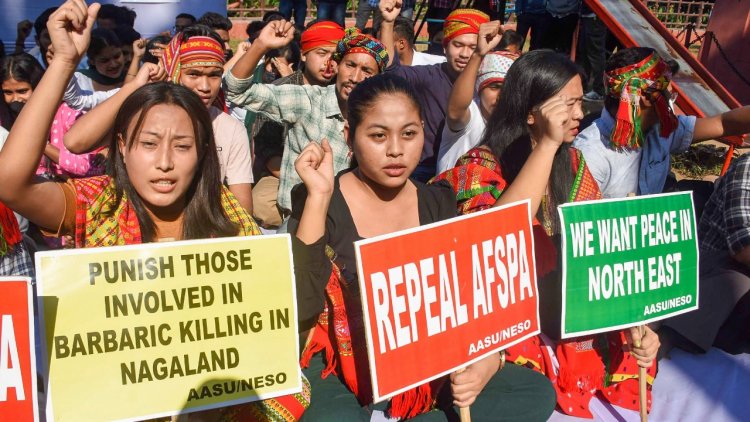Nagaland: Centre Exploring withdrawal of AFSPA
Asia News Agency

The Centre Thursday, extended the imposition of the Armed Forces Special Powers Act (AFSPA) in Nagaland by six months. Earlier in the week, the government formed a panel to consider withdrawal of the AFSPA from Nagaland. The panel will give its report in 45 days.
Most analysts see this as a step in the right direction. The Hindu sees it a progressive step. To recall, six civilians were killed in a botched Army operation in Mon district on December 4, and eight more in related violence thereafter, civil and political society in Nagaland have been demanding that the Centre withdraw the Act. On December 20, the Nagaland Assembly passed a unanimous resolution for repealing the Act while civil society organisations have led massive street protests across the state. In Nagaland, like in most parts of the Northeast and Jammu and Kashmir, the Act is seen to provide immunity even to those security personnel who target innocent civilians in the name of counter-terrorism operations.
The Centre has withdrawn the Act from large parts of the Northeast — Tripura, Meghalaya, districts in Arunachal Pradesh and Assam, for instance — in response to a decline in violence. The Naga insurgency, writes the paper “is a far more complex phenomenon, of course, but a new generation, more invested in peace and prosperity, has come of age in Nagaland….”
AFSPA is in place in Assam, Nagaland, Manipur, three districts of Arunachal Pradesh, and areas falling within the jurisdiction of eight police stations of the State bordering Assam, with the authority to use force or open fire to maintain public order in “disturbed areas”.
Justification for AFSPA
Writing for keeping the AFSPA Rajendra Prakash (retired Major General) says “with the Kashmir Valley continuing to remain, sporadically, on the boil, and with violence re-emerging in the Northeast, the public and political discourse on the Armed Forces (Special Powers) Act (AFSPA) has taken on unusual stridency.” The present debate he writes “is swayed by emotion, prejudice or cultivated ignorance, instead of resting upon a bedrock of facts and realities….”
Except “in war, or when guarding the international border, the Indian Army has no constitutional authority or legal powers to use force or firearms against anyone whosoever. Like any other Indian citizen, the only legal right a soldier has is the right of 'private defence’ (of life or property), which must be proved post-facto in a court of law, and this takes many years of court hearings. The only other possibility of such use of force by the armed forces is when called out in ‘aid to civil authority’, for which a magistrate must be present at each spot to authorise the use of force in writing on a particular form. Only after completing these formalities/procedures can troops be ‘lawfully' ordered to use ‘minimum force’ against civilians.
“The current modus operandi of terrorists, insurgents and militants does not allow the luxury of a magistrate’s presence at the time and place of an operation or encounter. Moreover, unless the security forces are quicker and forestall the adversary’s actions, they are likely to suffer heavy casualties. Thus, any military commander, army chief downwards, ordering his troops to operate in a counterinsurgency role…… would be giving an ‘unlawful command’, not liable to be obeyed. If obeyed, it could land all commanders, right down the chain — from corps, divisions, brigades, battalions, companies and, platoons to infantry sections — before the courts of law on charges of murder, assault, injury and destruction of property. Defending such cases, in courts, would, obviously, leave no time or resources for any other military responsibilities, for years.”
It is “to avoid such situations, and to ensure that the Army is able to perform its basic function of external defence and internal security of the nation, pragmatic lawmakers, in the 1950s, devised the AFSPA…….”
















